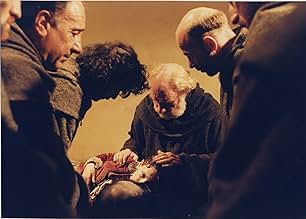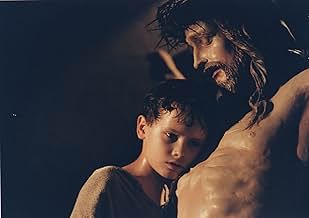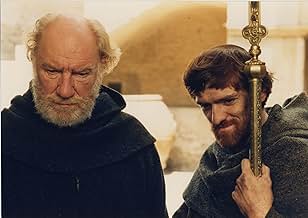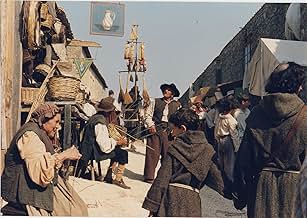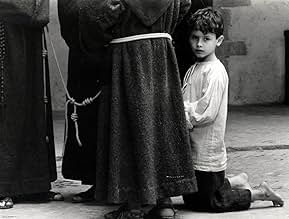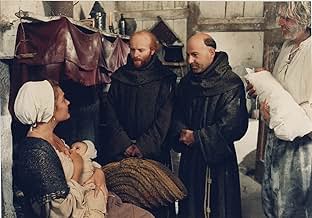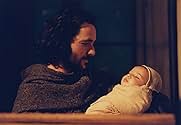Füge eine Handlung in deiner Sprache hinzuIn the 15th century, in a poor Italian village, the monks of a modest convent take up an abandoned baby. Unfortunately, for all their efforts, they prove unable to trace his parents. So they... Alles lesenIn the 15th century, in a poor Italian village, the monks of a modest convent take up an abandoned baby. Unfortunately, for all their efforts, they prove unable to trace his parents. So they set up providing tender loving care to the little boy. Marcellino lives a happy life amon... Alles lesenIn the 15th century, in a poor Italian village, the monks of a modest convent take up an abandoned baby. Unfortunately, for all their efforts, they prove unable to trace his parents. So they set up providing tender loving care to the little boy. Marcellino lives a happy life among the men of God but, as he grows up, he misses his mother more and more. To compensate fo... Alles lesen
- Regie
- Drehbuch
- Hauptbesetzung
- 1 Contadino mercato
- (as Quentin De Salivet)
Empfohlene Bewertungen
Spanish/Italian/French co-production dealing with a sensitive story proceeded in simplicity and delicacy by Lugi Comencini as when a marvelous friendship between Jesus and Marcelino is born . This a sensible and feeling movie full of mirth , humor touches and enjoyable message based on a novel by Jose Maria Sanchez Silva . At the same time the film gives us an agreeable panorama about monastery life , its pity and goodness ; furthermore , the oration , sacrifice , work , companionship and various situations happen in monastic existence . Its perfect developing resides on superb characters well played by all casting monks and the sympathy , simplicity of Nicolo-Marcelino , but inferior to unforgettable kid played by Pablito Calvo. Musical score by Florenzo Carpi responds appropriately to the ambient , originating a religious atmosphere , though extremely sweet . Precious and luminous cinematography who give us an accurate scenario of the times is developed . The motion picture is professionally directed by Luigi Comencini but is justly inferior to version filmed by Hungarian Ladislao Vadja , that was one of the best films to come out of Europe in the decade of the 50s and touched the hearts of numerous spectators around the world . This modern rendition resulted to be a flop and failed at box office .
It was to be his last film ,and it's his legacy .All this life,childhood had been in the center of his work.The Spanish movie was a mystic work,essentially dealing with faith ;few scenes would take us outside (except for the scene of the fair which effortlessly outclasses Comencini's)
More than "Christ and the saints appear to humble people" stuff (first Marcellino,Bernadette Soubirous.......) ,Comencini's main concern was his brat's longing for a mom .
In Vajda's film ,Manuel remains an imaginary character , a friend the kid invents ;Comencini's is a boy in the flesh .And it is pivotal :behind the fence , Marcellino sees Manuel embrace his mom and Nicolo Paolucci makes us feel his harrowing pain ;it is a recurrent feature in the great Italien maestro's canon : be they dead (the mom in 'incompreso" ) or alive but selfish (the dad in "l finestro sul Luna Park"),the lack of motherly (fatherly) love is the child's usual tragedy .In the original work,it's only skimmed over in the -much too short- scene with the mom whith a madonna face.
To have parents do not mean happiness for a child .The wealthy lord who pretends to be the boy's father poisons him with food ,luxury clothes in which the simple boy feels ill at ease : in "Voltati Eugenio" ,the bourgeois parents did not care for their child who found solace with a friend from the working class;in "incompreso" ,the father ,a consul ,wanted his sons to become men overnight after their mom's death .
And education does not necessarily mean happiness: to be taught about fighting,war ,or hunting does not make you a man : the real positive stuff is the alphabet the monk teaches( with a little help of Saint Sebastiane and Saint Andreas ) is the real key to knowledge ;in "Cuore",old school teacher Perboni was Comencini's spokesman ,a master who did not know his pupils would be confronted to the horrors of WW1.The Lord who claims to be Marcellino's dad know only one motto:might is right and using brute force to catch again the brat is only natural.French Bernard -Pierre Donnadieu is ideally cast as this hateful aristocrat .
Comencini's vision of the grown-ups world had always been pessimistic ;poverty ,horrors of war (crippled men in the street) ,the lord and his court wolfing down venison when the people has too much mouths to feed (the scene with the possible adoptive father lay stress at least as much on their poverty as on the working man's brutality .)
And the director makes his hero a rebel against the adults ' world; , he had made Franti ,Edmundo de Amicis 's bad boy in "Cuore" and Lucignolo in "Pinocchio ", postive characters who resisted the adamant moral standards.
Of course the scenes with Christ in the attic are kept to economical levels,which will infuriate Vajda's admirers ;but it was not the artist's priority ; the legendary side is reinforced by the "modern " sequences which frame the movie :schoolchildren buying souvenirs after visiting the premises : to carry on their earthly ride, pie in the sky is not enough for them.
Wusstest du schon
- VerbindungenRemake of Marcelino pan y vino (1979)

